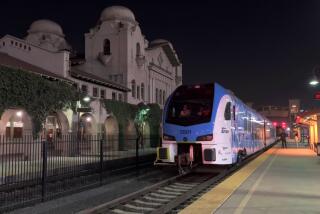RTD May Have Solution for Its Smoky Buses
- Share via
The RTD’s massive bus fleet, notorious for the odorous, dark fumes that belch from their backsides, may soon be outfitted with a device that has shown encouraging signs in reducing diesel exhaust emissions.
The so-called “platinum vapor injector” is being considered for use by the Southern California Rapid Transit District after a 90-day test in the Albuquerque, N.M., bus system.
The device has cut exhaust fumes by 25% by making the diesel fuel burn more efficiently, said John Richeson, the RTD’s assistant general manager for equipment and facilities. The device, developed by Technologies Limited of Albuquerque, will be brought to Los Angeles next week for a demonstration before RTD board members.
Richeson, who was given a demonstration of the device in Albuquerque on Wednesday, told the board at Thursday’s meeting that there was visible reduction in the amount of fumes, as well as a noticeable reduction in the odor.
“The smoke is gone and power is increased,” Richeson said in an interview. “From what I saw and smelled, this works. And they (Albuquerque transit officials) think it works--and they’ve been at it for 90 days.”
The device essentially works by injecting trace particles of platinum--about 70 parts of platinum per 1 billion parts of air--into the engine. The platinum, a precious metal that is also used in catalytic converters on cars, makes the diesel fuel burn at a substantially lower temperature, and thus more completely, Richeson said.
As of now, there is no indication that the device harms the engine or has any other negative side effects, Richeson said. On the contrary, he said, tests so far suggest that the new technology serves to clean the engine, potentially lowering maintenance costs.
“It’s encouraging,” he said. “What is untested are it’s long-range effects.”
If further tests are positive, Richeson said, he will recommend that the RTD’s entire fleet of 2,400 buses be outfitted with the devices, starting as soon as September. The total cost would be about $3 million.
More to Read
Sign up for Essential California
The most important California stories and recommendations in your inbox every morning.
You may occasionally receive promotional content from the Los Angeles Times.










